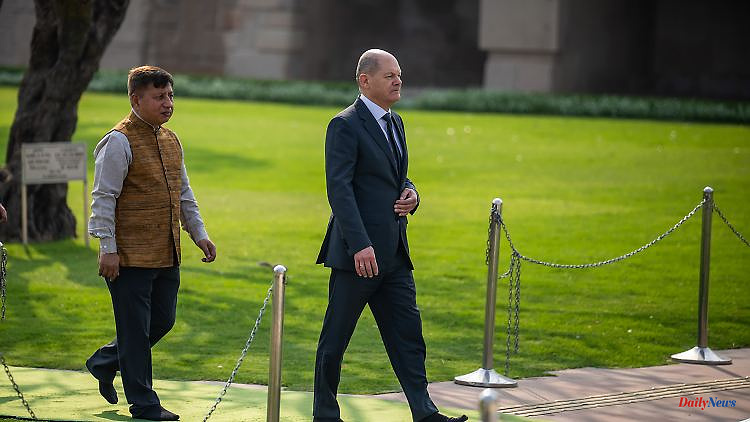To date, China has been Germany's largest trading partner. But another democratic country in Asia could take that place: India. During his visit, Chancellor Scholz drums for an expansion of economic relations. They also want to get closer in other areas.
Chancellor Olaf Scholz and Indian Prime Minister Narendra Modi want to significantly expand economic relations between the two countries. Cooperation will also be strengthened in the defense sector, Modi said after a meeting in New Delhi, without giving details. "The investments are to be expanded, the number of employees is to be increased massively," said Scholz, referring to the 1,800 German companies in India to date.
In addition, trade relations between the EU and India must be strengthened, emphasized Scholz. "That's why we're both committed to ensuring that the free trade agreement between our countries finally works." He will "personally get involved". The federal government is already in talks with the EU Commission.
The background is also Germany's desire to become more independent of China, Germany's largest trading partner. India, with its almost 1.4 billion inhabitants, has long been considered a possible alternative. However, German companies have been complaining about protectionism and bureaucracy for years, which makes investments by German car companies very difficult.
According to a survey by the foreign trade chambers of Singapore and India, the companies surveyed attach great importance to an EU-India free trade agreement. Scholz announced that the next Asia-Pacific conference of German business will take place in India in 2024. The chancellor campaigned for IT experts from India to be recruited to work in Germany. The two countries also want to work more closely together in the area of research and development.
Scholz will be accompanied by a business delegation on his two-day trip to New Delhi and Bangalore. In addition to energy issues, the topic will be closer armaments cooperation with India. According to information from the Reuters news agency, he wants to promote a multi-billion dollar submarine business. India wants to buy six conventional submarines worth 4.9 billion euros ($5.2 billion). ThyssenKrupp Marine Systems (TKMS) is under discussion. A conclusion during the visit is not expected.
When asked whether he had spoken to Modi about the submarine project, Scholz told German journalists: "Of course we also discussed specific projects. These are things that first have to be negotiated between the companies and the customers, but of course they have to be accompanied."
Among the agreements signed in New Delhi is an intergovernmental agreement on closer energy cooperation, particularly on hydrogen. The German company SFC Energy wants to expand its existing production of hydrogen fuel cells in India with a new production site in Gurgaon.
The German Solar Industry Association (BSW) initially wants to bring 20 to 30 photovoltaic experts to Germany. The German Research Foundation (DFG) and the Fraunhofer Society want to set up a hydrogen research institute in Pune, India.
After the talks with Modi, Scholz emphasized that democracies such as Germany and India should work more closely together, especially after the Russian war of aggression against Ukraine. In an article in the Times of India, he confirmed that Germany would become more involved in the Indo-Pacific region. Scholz called on the current Indian G20 presidency to address Russia's war of aggression against Ukraine as clearly as the Indonesian presidency of the group of the most important industrialized countries did last year.












